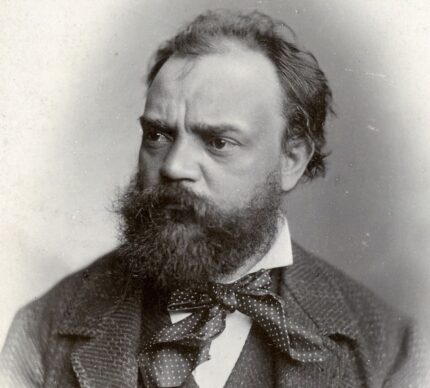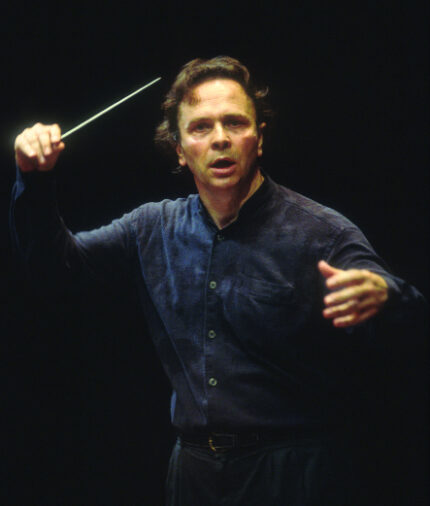Chicago Symphony’s three-week Dvořák Festival to close season in style

Of all the greatest composers, perhaps none wrote so much music in so many genres that still remains little known and unexplored than Antonin Dvořák.
The Czech composer, of course, is not exactly a fringe figure in the modern concert hall. His last three symphonies, the Cello Concerto, the Carnival Overture, Slavonic Dances, American String Quartet and Dumka Piano Trio are among the most popular and frequently performed works in the repertory.
Yet, even among aficionados, there are large parts of Dvořák’s imposing oeuvre that remain in the shadows. Yes, the Op. 96 Quartet is heard regularly but Dvořák wrote thirteen other works in the genre that are of a surprisingly consistent quality. His earlier symphonies and other shorter orchestral works—including the late, masterful tone poems based on grisly children’s folk fables—are rarely programmed. And, while Rusalka has become standard repertory, what of the composer’s other nine operas—curios such as Dimitrij, Kate and the Devil, The Jacobin, and King and Charcoal Burner (the last worth reviving for the wonderful title alone).
Starting Thursday, conductor Sir Mark Elder and the Chicago Symphony Orchestra will lift the veil on Dvořák with an intensive three-week festival that will offer a dozen performances of the Czech composer’s music through June 20. Elder will be joined by an array of first-class guests including Patricia Racette, Janine Jansen, Alisa Weilerstein, Rachel Barton Pine, and the Emerson String Quartet.
To be sure, the CSO’s season-closing fete will serve up many of Dvořák’s best-loved works, including Symphonies Nos. 7, 8 and 9, the Cello Concerto, the violin Romance, Song to the Moon from Rusalka and the Te Deum.
But most fascinating are the rarely heard works on the lineup: the overtures In Nature’s Realm and My Homeland, the final Op. 106 String Quartet, the Symphony No. 3, The Midday Witch, and excerpts from The Jacobin and the oratorio St. Ludmila.
“Well, that’s the point of a festival, isn’t it?” said Elder, a committed Dvořákian who will lead all CSO performances over the next three weeks. “To bring together a wide perspective of a composer’s output. People who are drawn by curiosity to hear pieces they’ve never heard before can rethink pieces that they have heard because of the context in which you play everything.”

The English conductor, who made his American debut with the CSO conducting Dvořák’s Symphony No. 5 in 1983, said that the composer’s thematic richness and practical experience as an orchestra player aided his distinctive approach to orchestration. “He had a great natural melodic gift that is comparable with Schubert’s.” says Elder. “When he was a young man and played the viola, he sat in the middle of different orchestras. And he learned how an orchestra sounds from inside, from the middle. And I believe that experience never left him as he developed his skill as an orchestrator.”
Dvořák had an innate gift for large-scale composition, says Elder, but it was his scoring skills that really bring his music to such vibrant life. “Dvořák’s orchestrations are much more colorful and personal and imaginative than Schubert’s ever were. Schubert was obviously a great composer, but in the realm of symphonic music, it’s not his orchestration one thinks of, so much as the incredible intensity of the musical ideas. With Dvořák the ideas may not always be as intense, but they’re so beautifully arranged, that we’re captivated.”
“It’s the folk element for sure,” says Alisa Weilerstein, who will be the soloist in Dvořák’s Cello Concerto June 10, 11 and 19. “And his love for his homeland. A lot of his music is so optimistic, which is kind of unusual, in a way.”
Even in the work she performs more than any other, Weilerstein says she never tires of Dvořák’s concerto. “It’s a masterpiece in every way. First of all, it’s structured perfectly. You couldn’t change a note. And I think it’s one of the most poignant pieces he ever wrote and it has the widest range of emotions of any cello concerto we have.”
“There’s the terrific melodic gift that he has, like Schubert,” adds Eugene Drucker of the Emerson String Quartet. “Then, of course, the deep association with folk music. It’s more European, less angular than you hear later with Bartok and Janacek.”
“Also, I think one thing that people forget is the tragic side,” adds Drucker. “What’s striking about many of the quartets is the darkness in the slow movements.”
Conductor Elder believes that Dvořák’s prolific output ironically, is the principal reason why so much of his music lay undiscovered. “I believe the works we’re playing that are not well known would be well known if he hadn’t written so many pieces.”
Among those rarities is the Symphony No. 3, an early work in three movements that still shows the young composer under the influences of Wagner and Brahms. As a youthful work the Third is less consistent than Dvořák’s later essays, with a somewhat ramshackle structure and brief finale. Still, the Third is a work Elder is fond of and that he believes has its own considerable merits.
“The Third has fantastic melodic appeal. I mean, the opening of the Third Symphony is one of the great Dvořák openings–the way the gentle pulse starts in the strings and the timpani and then the violins sing this lovely melody that seems so natural you think, ‘Have I heard this before?’ It’s so great, it just comes straight to your heart.”
The original plan was to round off the festival with a concert version of a Dvořák opera, something that proved too costly in the current economic climate. Yet while less ambitious, Elder has come up with a mixed bag of Dvořák “appetizers,” for the final program on June 20, including My Homeland, the Romance for Violin, several Slavonic Dances, arias from St. Ludmila and Rusalka, the complete first scene of The Jacobin, and the choral Te Deum.
Elder said he feels his own approach to Dvořák’s music has evolved and become more idiomatic over the years. “I’m much more aware of the Czech rhythms and Janáček. I think I make more of his orchestration now than before. For example, he writes very beautifully and very imaginatively for trumpets and trombones. But the brass must be like a little group, adding a bit of brilliance and punctuated rhythm and melody.”
The essence of Dvořák’s sound world is never far removed from the furiant Bohemian rhythms and the dance, says Elder. “So much of his music is infected with Czech rhythms and there you want to be nimble and you want to think of everybody dancing and enjoying themselves. That really is the key to Dvořák’s music.”
Perhaps in addition to the melodic richness and bracing folk accents, it is the vulnerability and human qualities of Dvořák that continue to move us—an unassuming, somewhat naïve man who loved trainspotting and kept carrier pigeons, yet created some of the most affecting and memorable music ever written.
“He was a slightly eccentric but very warm-hearted and generous man,” said Elder. “And I think that’s something that always comes out in his music.”
The Chicago Symphony Orchestra’s Dvořák Festival opens 8 p.m. Thursday with conductor Sir Mark Elder and violinist Janine Jansen in a program featuring the Scherzo capriccioso, Violin Concerto and Symphony No. 7. www.cso.org; 312-294-3000
Posted in Uncategorized




